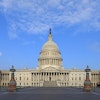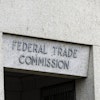Americans Deserve a Transparent and Accountable FTC
The Federal Trade Commission’s (FTC) recent actions are alarming and pose a serious threat to our economy.

American companies are already facing historic challenges with inflation, strained supply chains and worker shortages, and the FTC's actions are only accelerating uncertainty and threatening our economy.
Under Chairwoman Lina Khan, the FTC has radically departed from its core mission to protect consumers and competition.
Rather, the FTC is overstepping its regulatory authority, undermining our system of checks and balances, ignoring due process, and bypassing longstanding regulatory norms to expansively regulate industries and manage our economy with a government knows best approach.
Areas of Overreach
- RulemakingUnder Lina Khan the FTC has embarked on a rulemaking bonanza often skirting or outright ignoring whether or not it has Congressional authorization.Read More
- LitigationThe FTC’s litigious approach to enforcement is denying companies basic rights to due process.Read More
- Merger ActivityBy improperly using a rulemaking process, the FTC is poised rewrite antitrust law based off false economic and often partisan assumptions.Read More
Holding the FTC accountable on Capitol Hill
On Capitol Hill
The FTC has engaged in its own unfair and deceptive practices as it lobbies Congress to pass legislation that would give the agency sweeping authority.
Holding the FTC accountable in the courts
In the courts
The FTC is bypassing longstanding norms to expansively regulate industries and manage our economy with a government-knows-best approach.

FTC: A Timeline of An Agency Gone Rogue
This timeline shows the ways in which Chairwoman Khan has moved to silence dissent at the FTC and consolidated power in ways that call into question the independence of the agency.
Learn More
Explore More
- Antitrust
A Shift in Merger Enforcement Risks Damaging Our EconomyA new study finds that under the previous approach to merger enforcement there was a strong link between mergers and innovation. A radical new approach to merger enforcement poses a severe threat to the economy.
By Sean Heather
- Antitrust
What Does the FTC Want to Ban Next?
By Sean Heather
- Antitrust
Inside the FTC’s Ploy to Quash A BioTech Merger
By Sean Heather - Employment Policy
6 Questions About the Impact of Noncompete Agreements on Businesses and Employees
By Stephanie Ferguson Melhorn
FTC Overreach
- Regulations
The Chamber of Commerce Will Fight the FTCThe U.S. Chamber of Commerce will fight in court to hold the FTC accountable to the rule of law.
- Antitrust
What the Experts Think About the FTC
By Sean Heather
Competition and the FTC
Consumer Protection and the FTC
Rulemaking and the FTC
FOIAs and the FTC
Mergers and the FTC
- Antitrust
Why FTC’s Lawsuit Against Meta Is Concerning for the Entire Business CommunityRather than economics, the FTC’s complaint against Meta seems grounded in the malleable concept of “potential future competition.” Here's why the business community should be concerned.
By Sean Heather
Latest Content
In Franz Kafka’s The Trial, a man is prosecuted by a remote, inscrutable authority. With the nature of his offense unclear and the court’s jurisdiction ambiguous, the entire process becomes bewildering and interminable. As he navigates a labyrinth of bureaucratic traps, the proceedings themselves “gradually merge into the judgment.” Ultimately, Kafka’s character is deemed guilty, without ever hearing the charges against him or having a chance to defend himself.
In 1914, the Federal Trade Commission (FTC) was created when President Woodrow Wilson signed the Federal Trade Commission Act into law. Since its founding, the FTC has held a unique and multifaceted role in the U.S. administrative state and the economy.
This Hill letter was sent to Members of the House Energy and Commerce Committee’s Subcommittee on Consumer Protection & Commerce on the hearing “Transforming the FTC: Legislation to Modernize Consumer Protection.”
WASHINGTON, D.C. - The following statement can be attributed to Sean Heather, Senior Vice President, International Regulatory Affairs and Antitrust, U.S. Chamber of Commerce.
This Coalition letter was sent to the Members of the Senate Committee Commerce, Science, and Transportation on the Federal Trade Commission's statutory authority and H.R. 2668, the "Consumer Protection and Recovery Act."
The U.S. Chamber of Commerce writes to express our concerns with the Open Meeting scheduled for July 1, 2021 that was noticed on June 24, 2021.[1] Although the Federal Trade Commission (“FTC” or “Commission”) has expressed its intention to “open the work of the Commission” to the public, the FTC has failed to provide meaningful notice or adequate opportunity to comment on the pending items to be voted upon on July 1.
The Federal Trade Commission is seeking, through legislation, authority it is not supposed to have.
This Hill letter was sent to the Members of the House Committee on Energy and Commerce, in advance of a hearing entitled, “The Consumer Protection and Recovery Act: Returning Money to Defrauded Consumers."
This Hill letter was sent to the Members of the Senate Committee on Commerce, Science, and Transportation, in advance of a hearing entitled, “Strengthening the Federal Trade Commission’s Authority to Protect Consumers."
U.S. Chamber Comments to the Federal Trade Commission supporting a national privacy framework.
















